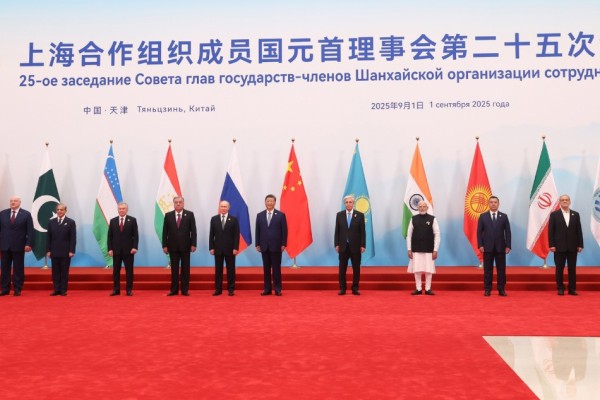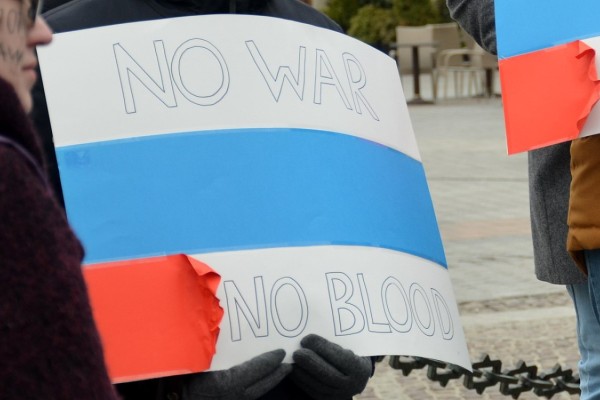-

Canada needs diplomacy to reach out to growing economies
Canada faces a critical choice in foreign policy: continue following Europe and the US in militarization, or pursue diplomacy with growing global powers. Yakov M. Rabkin argues that Canada should diversify economic and political ties toward nations like China, India, and Russia, prioritizing dialogue over containment, while safeguarding social programs and democratic debate at home.
-

Hope and despair in Russia’s anti-war movement
The two-day congress of the Platforma network in Brussels brought together hundreds of anti-war activists, some of whom are still active in Russia. On stage hung the theme of the gathering: “Standing Together for Ukraine and for Freedom.” Around 300 people gathered under it, including Russian activists, Ukrainian human rights campaigners, and delegates from the EU and beyond.
-

Weidel and the White House won the federal elections in Germany
The real winners of the German election are the hard-right leader Alice Weidel and her White House friends, Elon Musk, J.D. Vance and Donald Trump. Whatever Friedrich Merz’s plans are, he must expect barrage fire from the Weidel-White House connection. Looking back at the election campaign, it looks like he’s actually inviting it.
-

Germany’s new right: Trading on nostalgia for past prosperity in an age of uncertainty
This long-read offers a different explanation for the hard-right surge in Germany. It shows that German unification in 1990, signalling the triumph of liberal democracy and the onset of neoliberal globalization, unleashed a new form of nationalism—Deutschmark nationalism—which, after mutating into export nationalism for a while, became the ideological seed for the AfD.
-

Squatting the master’s house? Lessons in grassroots resistance from Bologna
In an historic victory for grassroots resistance, an Italian court has set a precedent by recognizing moral grounds for defying state violence. On December 12, 2024 a Bologna court ruled that members of Làbas, a social centre in Italy’s most left-wing city, acted out of “particular social and moral value” when they resisted a violent eviction by militarized police in 2017.
-
_600_400_90_s_c1.jpg)
Europe at the ‘hot gates’
Like the 300 Spartans at Thermopylae, the West’s distribution to Ukraine of Russia’s $300 billion in assets will not be enough to prevent eventual defeat. The Ukraine war will almost certainly be resolved within the next 12 months—on the ground, not with bank accounts. Like the Spartans at Thermopylae, time may run out for Ukraine even before Europe can buy some more of it.
-

In Ukraine war’s shadow, cracks emerging in European consensus
It may appear that European unity on Ukraine is crumbling. This would be a false conclusion. Hungary and Slovakia are very much outliers. Elsewhere in Europe, political leaders remain utterly committed to the Ukrainian cause, and perhaps rather oblivious to the military realities, continuing to talk of supporting Ukraine for “as long as it takes.”
-

Starmer’s Labour: the UK establishment’s supernova
With the Conservatives headed into disintegration or irrelevance, the incoming Labour government may prove the penultimate stage in the collapse of the UK political establishment. The brightness of its success in fashioning Starmer’s Labour into its instrument is the gaseous brilliance of the supernova, the efflorescence that precedes a star’s death.
-

The West’s double standards on Georgia’s ‘foreign agents’ bill
It would appear that requiring foreign-funded organizations to register with the government is acceptable as long as it is Western states doing the requiring. But when the tables are turned, and it is Western-funded institutions that are being obliged to register, suddenly foreign agent laws turn out to be threats to democracy that are incompatible with fundamental values.
-

Buried trial verdict confirms false-flag Maidan massacre in Ukraine
Ten years since the Maidan massacre, nobody is in prison for the murders and attempted murders of activists and police officers, or for shooting at foreign journalists. The silence on the part of those who deny the false-flag event, or who call these claims a “conspiracy theory” and whitewash the mass murderers of the far-right, is both deafening and revealing.



